

George Lipsitz



vii
I began to suspect that white people did not act as they did because they were white, but for some other reason, and I began to try to locate and understand the reason.
-JAMES BALDWIN
 his book argues that public policy and private prejudice work together to create a "possessive investment in whiteness" that is responsible for the racialized hierarchies of our society. I use the term possessive investment both literally and figuratively. Whiteness has a cash value: it accounts for advantages that come to individuals through profits made from housing secured in discriminatory markets, through the unequal educational opportunities available to children of different races, through insider networks that channel employment opportunities to the relatives and friends of those who have profited most from present and past racial discrimination, and especially through intergenerational transfers of inherited wealth that pass on the spoils of discrimination to succeeding generations. I argue that white Americans are encouraged to invest in whiteness, to remain true to an identity that provides them with resources, power, and opportunity. This whiteness is, of course, a delusion, a scientific and cultural fiction that like all racial identities has no valid foundation in biology or anthropology. Whiteness is, however, a social fact, an identity created and continued with all-too-real consequences for the distribution of wealth, prestige, and opportunity.
his book argues that public policy and private prejudice work together to create a "possessive investment in whiteness" that is responsible for the racialized hierarchies of our society. I use the term possessive investment both literally and figuratively. Whiteness has a cash value: it accounts for advantages that come to individuals through profits made from housing secured in discriminatory markets, through the unequal educational opportunities available to children of different races, through insider networks that channel employment opportunities to the relatives and friends of those who have profited most from present and past racial discrimination, and especially through intergenerational transfers of inherited wealth that pass on the spoils of discrimination to succeeding generations. I argue that white Americans are encouraged to invest in whiteness, to remain true to an identity that provides them with resources, power, and opportunity. This whiteness is, of course, a delusion, a scientific and cultural fiction that like all racial identities has no valid foundation in biology or anthropology. Whiteness is, however, a social fact, an identity created and continued with all-too-real consequences for the distribution of wealth, prestige, and opportunity.
The term investment denotes time spent on a given end, and this book also attempts to explore how social and cultural forces encourage white people to expend time and energy on the creation and re-creation of whiteness. Despite intense and frequent disavowal that whiteness means anything at all to those so designated, recent surveys have shown repeatedly that nearly every social choice that white people make about where theylive, what schools their children attend, what careers they pursue, and what policies they endorse is shaped by considerations involving race.' I use the adjective possessive to stress the relationship between whiteness and asset accumulation in our society, to connect attitudes to interests, to demonstrate that white supremacy is usually less a matter of direct, referential, and snarling contempt and more a system for protecting the privileges of whites by denying communities of color opportunities for asset accumulation and upward mobility. Whiteness is invested in, like property, but it is also a means of accumulating property and keeping it from others. While one can possess one's investments, one can also be possessed by them. I contend that the artificial construction of whiteness almost always comes to possess white people themselves unless they develop antiracist identities, unless they disinvest and divest themselves of their investments in white supremacy.
I hope it is clear that opposing whiteness is not the same as opposing white people. White supremacy is an equal opportunity employer; nonwhite people can become active agents of white supremacy as well as passive participants in its hierarchies and rewards. One way of becoming an insider is by participating in the exclusion of other outsiders. An individual might even secure a seat on the Supreme Court on this basis. On the other hand, if not every white supremacist is white, it follows that not all white people have to become complicit with white supremacy-that there is an element of choice in all of this. White people always have the option of becoming antiracist, although not enough have done so. We do not choose our color, but we do choose our commitments. We do not choose our parents, but we do choose our politics. Yet we do not make these decisions in a vacuum; they occur within a social structure that gives value to whiteness and offers rewards for racism.
I write this book in response to the crisis that confronts us in regard to race. But as with most books, its origins are complex and complicated. Perhaps the best way I can situate my engagement with the possessive investment in whiteness is by relating my connection to a crime that took place decades ago, when I was a teenager. On April 23, 1963, Bill Moore was shot to death at close range alongside a highway in northern Alabama. The thirty-five-year-old father of three children received two .22 caliber slugs in his head and one in his neck.
When Moore was murdered, he was just beginning a one-man civil rights march from Chattanooga, Tennessee, to Jackson, Mississippi. A white man raised in the deep South, Moore had been working as a post office employee in Baltimore. He had been horrified in 1962 by Mississippi governor Ross Barnett's efforts to prevent the desegregation of the University of Mississippi. When a federal court judge had to intervene to order the university to admit a fully qualified twenty-nine-year-old Air Force veteran as its first black student, Barnett countered with a pledge of total resistance, declaring the state's authority to be superior to that of the federal government. President Kennedy sent National Guard troops to Oxford, Mississippi to force compliance with the court's order, but a rioting mob of whites resisted with a rampage that left two people dead and almost four hundred injured.2
Distressed by the violence in Mississippi, Moore asked himselfwhat he could do to help. He had recently moved from Binghamton, New York, to Baltimore for the express purpose of becoming active in the front lines of the civil rights movement. Encouraged by the positive publicity surrounding a march on the Maryland state capital organized by the Baltimore chapter of the Congress of Racial Equality earlier that year, Moore decided that he would stage his own one-man march. Playing on his identity as a postal worker, he decided to "deliver a letter" expressing support for integration to Governor Barnett. In his message, Moore advised the Mississippi governor "not to go down in infamy as one who fought the democracy for all which you have not the power to prevent."3

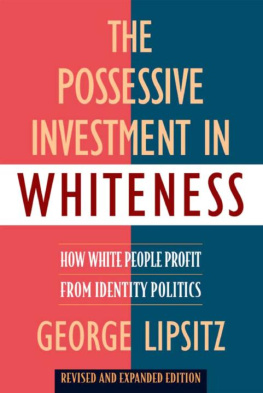

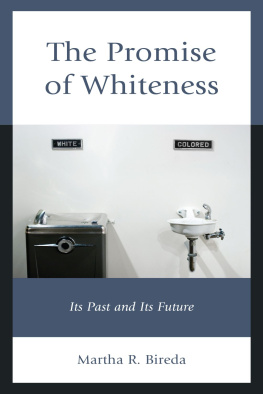

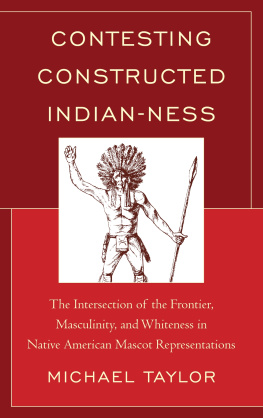
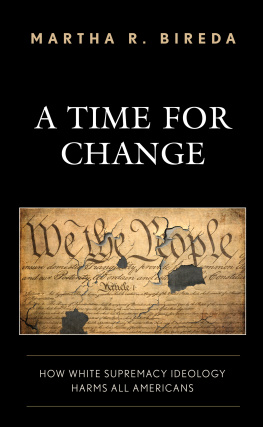

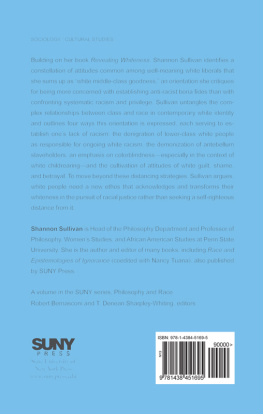
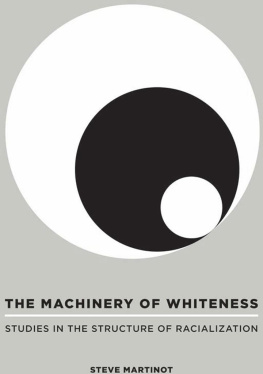


 his book argues that public policy and private prejudice work together to create a "possessive investment in whiteness" that is responsible for the racialized hierarchies of our society. I use the term possessive investment both literally and figuratively. Whiteness has a cash value: it accounts for advantages that come to individuals through profits made from housing secured in discriminatory markets, through the unequal educational opportunities available to children of different races, through insider networks that channel employment opportunities to the relatives and friends of those who have profited most from present and past racial discrimination, and especially through intergenerational transfers of inherited wealth that pass on the spoils of discrimination to succeeding generations. I argue that white Americans are encouraged to invest in whiteness, to remain true to an identity that provides them with resources, power, and opportunity. This whiteness is, of course, a delusion, a scientific and cultural fiction that like all racial identities has no valid foundation in biology or anthropology. Whiteness is, however, a social fact, an identity created and continued with all-too-real consequences for the distribution of wealth, prestige, and opportunity.
his book argues that public policy and private prejudice work together to create a "possessive investment in whiteness" that is responsible for the racialized hierarchies of our society. I use the term possessive investment both literally and figuratively. Whiteness has a cash value: it accounts for advantages that come to individuals through profits made from housing secured in discriminatory markets, through the unequal educational opportunities available to children of different races, through insider networks that channel employment opportunities to the relatives and friends of those who have profited most from present and past racial discrimination, and especially through intergenerational transfers of inherited wealth that pass on the spoils of discrimination to succeeding generations. I argue that white Americans are encouraged to invest in whiteness, to remain true to an identity that provides them with resources, power, and opportunity. This whiteness is, of course, a delusion, a scientific and cultural fiction that like all racial identities has no valid foundation in biology or anthropology. Whiteness is, however, a social fact, an identity created and continued with all-too-real consequences for the distribution of wealth, prestige, and opportunity.